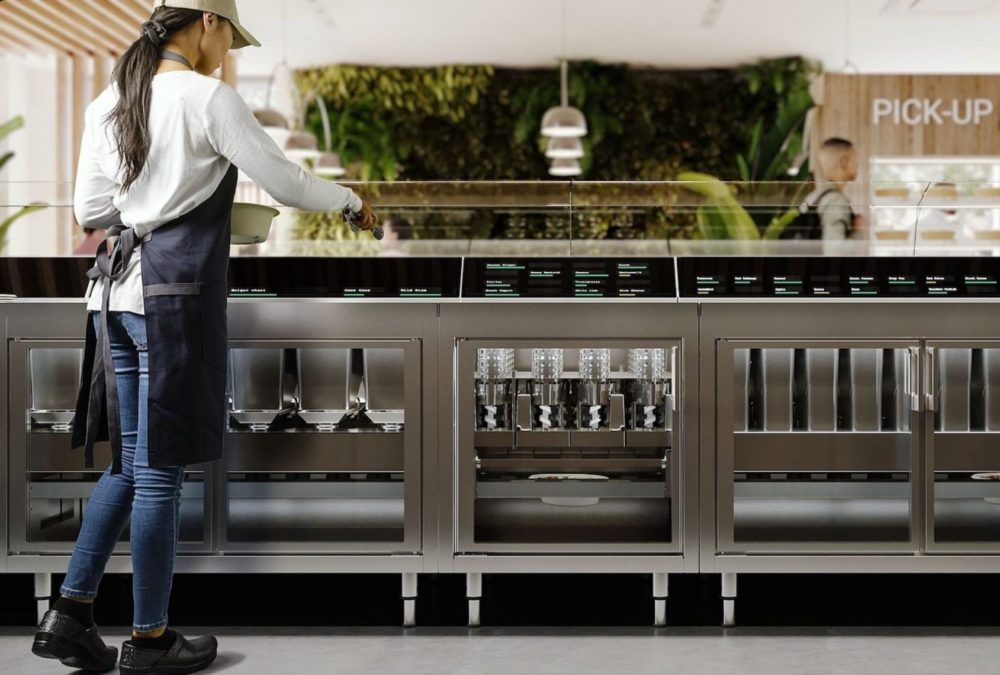Disclosure: AFN’s parent company, AgFunder, is an investor in Hyphen.
US-based Hyphen has raised $24 million in a round led by Tiger Global to expand its robotic makeline to more commercial kitchens in the US.
Toast co-founder and president Steve Fredette also participated in the Series A round along with existing investors including Apollo Global Management co-founder and CEO Marc Rowan; and Donald Moore, former chief culinary officer at The Cheesecake Factory.
The San Jose-based startup had previously raised $7 million from investors including AgFunder for its August 2020 seed round.
Hyphen’s robotic system, simply dubbed The Makeline, takes the place of conventional makelines: kitchen assembly lines in restaurants that allow foodservice teams to quickly and collaboratively prepare items such as pizzas, burritos, and subs.
The Makeline has two parts: a top portion where humans manually prepare orders, and a lower portion that automates the assembly of bowls, salads, and similar items. The latter is specifically meant to fulfill digital orders placed via a restaurant’s website or app, or through third-party delivery services.
Aided by sensors, The Makeline uses AI-based vision to monitor portion quality, accuracy, and size of orders. The system also monitors its inventory of ingredients “down to the gram,” Hyphen co-founder and CEO Stephen Klein tells AFN. When an ingredient runs low, The Makeline will alert the kitchen so a staffer can refill the tray.
Hyphen claims its machines can make 350 meals every hour with 99.9% order accuracy.
Robots take sick breaks, too
It’s hard to exaggerate the difficulties restaurants have faced over the last couple years due to the Covid-19 pandemic. Lockdowns, partial closures, and capacity restrictions took an economic toll on the whole industry. In the US, understaffed restaurants struggle to keep up with order volume, particularly when it comes to juggling in-house orders with the rising number of those placed via digital channels.
Since the start of the pandemic, restaurant tech companies have promised to aid in the above challenges, using buzzwords like ‘automation,’ ‘efficiency,’ and ‘streamline’ to describe what their products can do for commercial kitchens. Results have been varied, and restaurants are way less likely to adopt a solution if it can’t provide immediate value in an industry where margins are razor thin – even on a good day.
Klein says Hyphen hasn’t gotten any pushback from restaurants about adopting its system, which he says is “not a ‘nice-to-have’ but a need.”
The most important advantage that Hyphen’s solution has over others, according to Klein, is that it’s half-automated, half-manual. Even when the robot part of The Makeline goes down, staffers can still use the system.
Klein likens it to an escalator, which is still operational as a staircase when there’s a problem and it grinds to a halt.
“Robots do take sick breaks, they do go down,” he says. “That’s why it’s important to have a safeguard in place.”
Klein also posits the advantages that Hyphen’s automated makeline setup has over systems that rely on articulating robotic arms, which are expensive and tend to take up more space than most restaurants can part with. He estimates it would take 16 robotic arms and the space of a small apartment to get the throughput of one Hyphen machine.
Finally, since The Makeline’s system monitors ingredients and shares data on how much to prep and when, restaurants could potentially cut down on food waste from inaccurate orders and over-portioning.
“One thing that’s often overlooked is the food costs,” says Klein, adding that these are going up because of inflation. The Makeline “can make sure there’s less food waste because [the] line cook is prepping the right amount of food at the right time,” he adds.
What’s next?
Hyphen will use the Series A funding to expand into new US markets including Seattle, Los Angeles, New York City, San Francisco, and Phoenix. It will also invest some of the funds in R&D for further product development and into hiring new staff in design, engineering, and operations.
Without giving names, Klein says Hyphen’s customer base is mostly made up of salad chains and other restaurants that sell bowl-style meals. The company also has “a co-packer that does pre-packaged salads for a very large grocery” as well as a corporate caterer on its client list, he adds.





